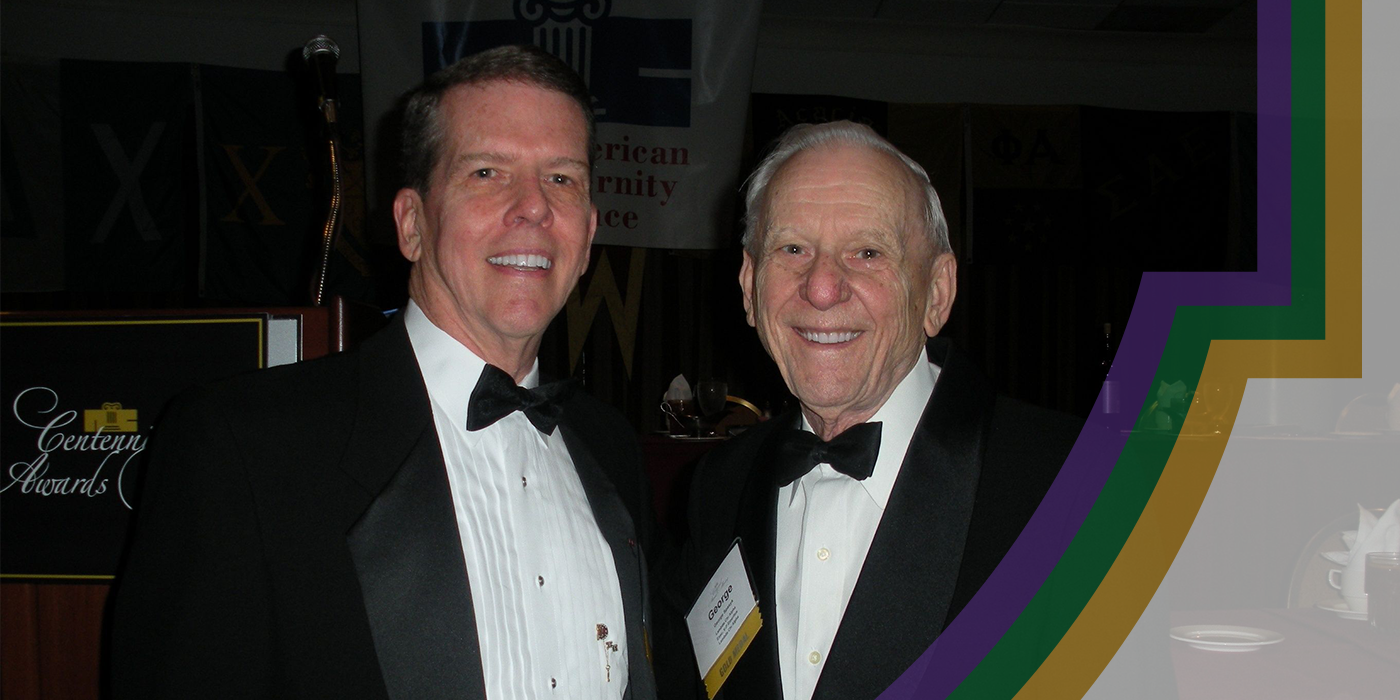Author, Mike Raymond (Miami-OH) – Lambda Chi Alpha Historian
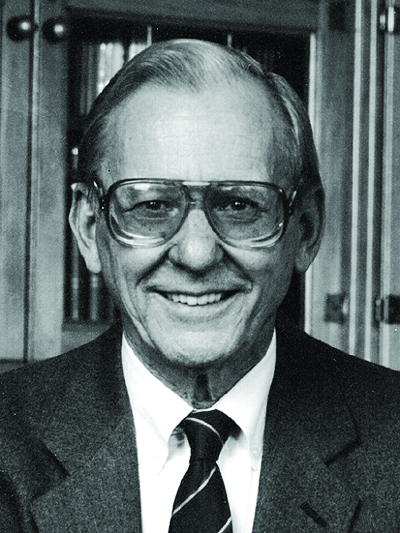 What a great man. What a loss to the members of Lambda Chi Alpha Fraternity and the inter-fraternal world. George Spasyk was a man devoted to Lambda Chi Alpha, Sigma Zeta (University of Michigan), the Wolverines, and to the fraternity world in general.
What a great man. What a loss to the members of Lambda Chi Alpha Fraternity and the inter-fraternal world. George Spasyk was a man devoted to Lambda Chi Alpha, Sigma Zeta (University of Michigan), the Wolverines, and to the fraternity world in general.
He was a diligent guardian of the ideals and beliefs of Lambda Chi Alpha and a progressive thinker and actor in a very conservative environment. He had a vision of Lambda Chi Alpha, that few accepted at first and some still resist now, of a pledge-free fraternal experience. That was a radical idea back in the 1970s when he wrote an article in the Cross & Crescent that challenged the near universal support for pledging.
Personally, I can remember the days of line-ups, verbal and physical abuse, mental games, and whatever traumatizing thing an active member could think of doing to a pledge. George didn’t believe that this type of demeaning and dangerous system had anything to do with brotherhood.
Now about 50 years later we still read about the behavior of fraternity men that leads to injury and death. George fought this type of behavior his entire life. He was a tireless advocate of a pledge-free experience as a genuine expression of fraternalism. Speaking to people at all levels of our Fraternity from small groups of alumni, to individual chapter meetings, to the Grand High Zeta, and most other Greek organizations, he constantly spoke out against pledging. While the battle over hazing continues, his legacy will be an ever growing consensus that Greek organizations must relentlessly stamp out hazing.
From 1969 to the summer of 1990 George wrote 72 essays in the Cross & Crescent under the heading of “Reflections.” The range of topics George covered in Reflections was staggering. Everything from pledging to marriage to university relations to Willard Fillmore can be found in the 72 articles, containing 187 pages of subject matter, he wrote for the Cross & Crescent. Always thoughtful, sometimes taking a hard stance on an issue, and often inspirational he wrote to guide our Fraternity.
To help gauge George’s character let’s look at some of the articles he wrote while serving as the Executive Director of our Fraternity.
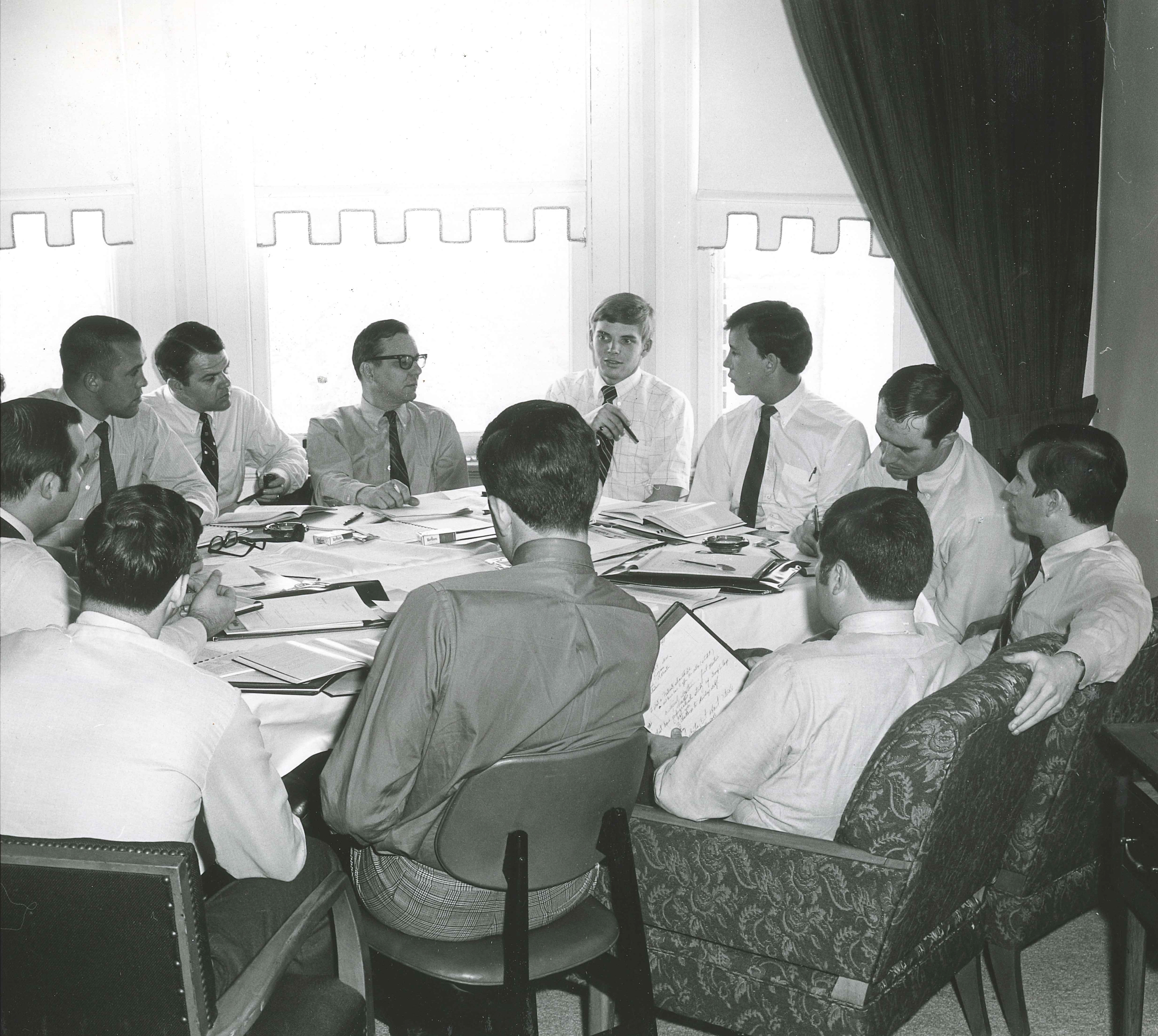
An essay that George wrote, and probably his most influential piece, was “Pledges – Who Needs Them?” This article appeared in the February, 1970 issue of the Cross & Crescent. In this essay he stated that Lambda Chi could not only do without pledges but that must do so.
George, always the intelligent thinker, based his no pledge stance on the outcomes of group meetings from the Grand High Zeta to the many personal contacts among our members – both Alumni and undergraduates. He also based his opinion on careful research and study. He found statistical information that showed him that about 1 out of 5 new recruits left Lambda Chi Alpha by their own action to depledge. George thought that was a tragic loss of many good men and the pool of talent that they represented.
Not satisfied with just condemning pledging he went on to describe a new look at the whole concept. His idea to eliminate pledging was hard for many fraternity men to accept but it has become standard practice for virtually every fraternity today. For the first time the term Associate Member appears in print as a replacement for pledges.
Here is what he had in mind concerning the characteristics of his new approach to membership recruitment and retention:
- No distinction between active and pledge.
- The pledge period should not last more than six to eight weeks.
- Chapter work sessions replace pledge work sessions.
- Pledges attend a major number or portion of chapter meetings.
- Pledges are included in committees and are given a voice in chapter affairs
- Pledge class unity is discouraged because it results in divisions within the chapter.
- Pledges are not subservient to active members and discipline of pledges is the same as it is for actives.
- Pledge instruction is transformed from classroom techniques to group discussions, case studies, and individual development.
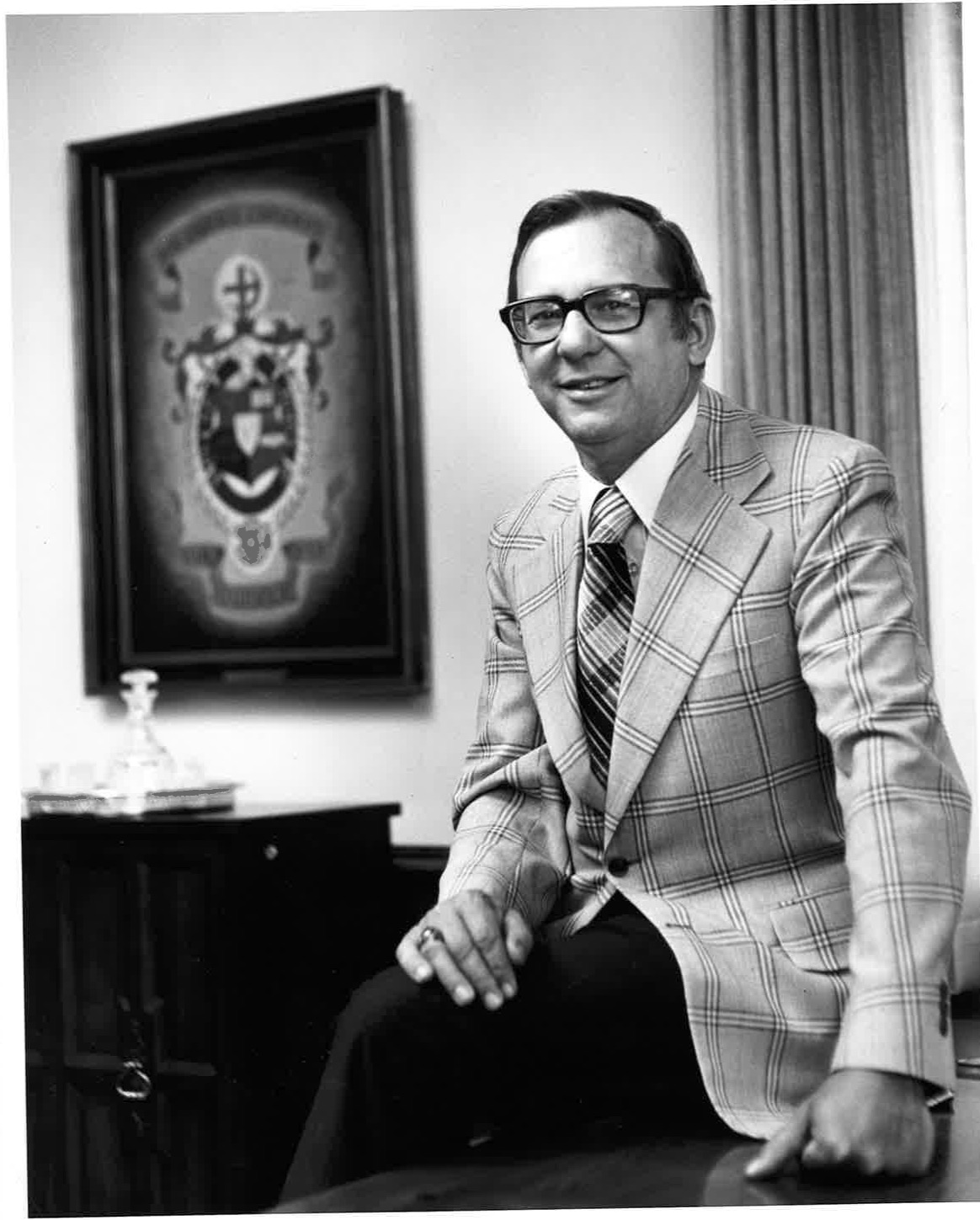 This list embodies the characteristics of the current philosophy of Lambda Chi Alpha’s Associate Member program. Seldom in my experience has an article been so influential in reforming an organization. It stands as a monument to his dedication to our fraternity and to his vision of a true brotherhood.
This list embodies the characteristics of the current philosophy of Lambda Chi Alpha’s Associate Member program. Seldom in my experience has an article been so influential in reforming an organization. It stands as a monument to his dedication to our fraternity and to his vision of a true brotherhood.
In a December 1972 article, dealing with the concept of change, George announced what was probably his greatest achievement as a fraternity man. In his remarks about the Portland General Assembly (1972), he praised the work of its delegates in passing major reforms. This legislation eliminated pledging, replaced pledge training with Fraternity Education, and replaced the term pledge with Associate Member. In George’s view this body of legislation was the most fundamental reform in the history of Lambda Chi Alpha. As a leader George was so respected that there is little doubt that this legislation would have lingered for years without George supporting it.
George was not a fan of Little Sister programs that were found throughout Lambda Chi prior to mid-1980s. He considered Crescent Clubs, Crescents, or whatever name these groups called themselves a cancer. He felt that these unrecognized organizations were a serious problem for both fraternal organizations and sororities.
Personally, I had good experience with my Zeta’s Crescent Club and found the members to be very helpful in recruitment, in planning social events, and as a general source of fun. However, I can see his point that having women’s auxiliaries could jeopardize our single sex based organization and hurt sororities in their efforts to recruit new members. Many of the Crescent Clubs took on the characteristics of a chapter and functioned with officers and simple rituals. To George this fact was not acceptable and these informal groups had to go.
The Fraternity Executives Association passed a resolution in 1983, with George as a powerful voice supporting the resolution, that condemned little sister programs as demeaning to woman and undermining the concept of separate and equal sororities.
While this issue is still a battleground, with a number of colleges and universities trying to force the integration of women into traditionally male fraternities, Lambda Chi Alpha and most other fraternities stand opposed to the concept.
George wrote a prophetic article in 1989 that he entitled, “In Loco Parentis is Alive and Well”. In Loco Parentis is a legal doctrine that recognized and gave authority to campus officials to act in lieu of parents when it came to regulating college student’s behavior.
Prior to the late 1960s the doctrine was followed almost religiously by campus authorities. The Dean of Students had almost absolute power to enforce such rules as dress codes, dancing decorum, dormitory hours for women (it was 12:00 midnight on my campus), and control over student smoking and drinking.
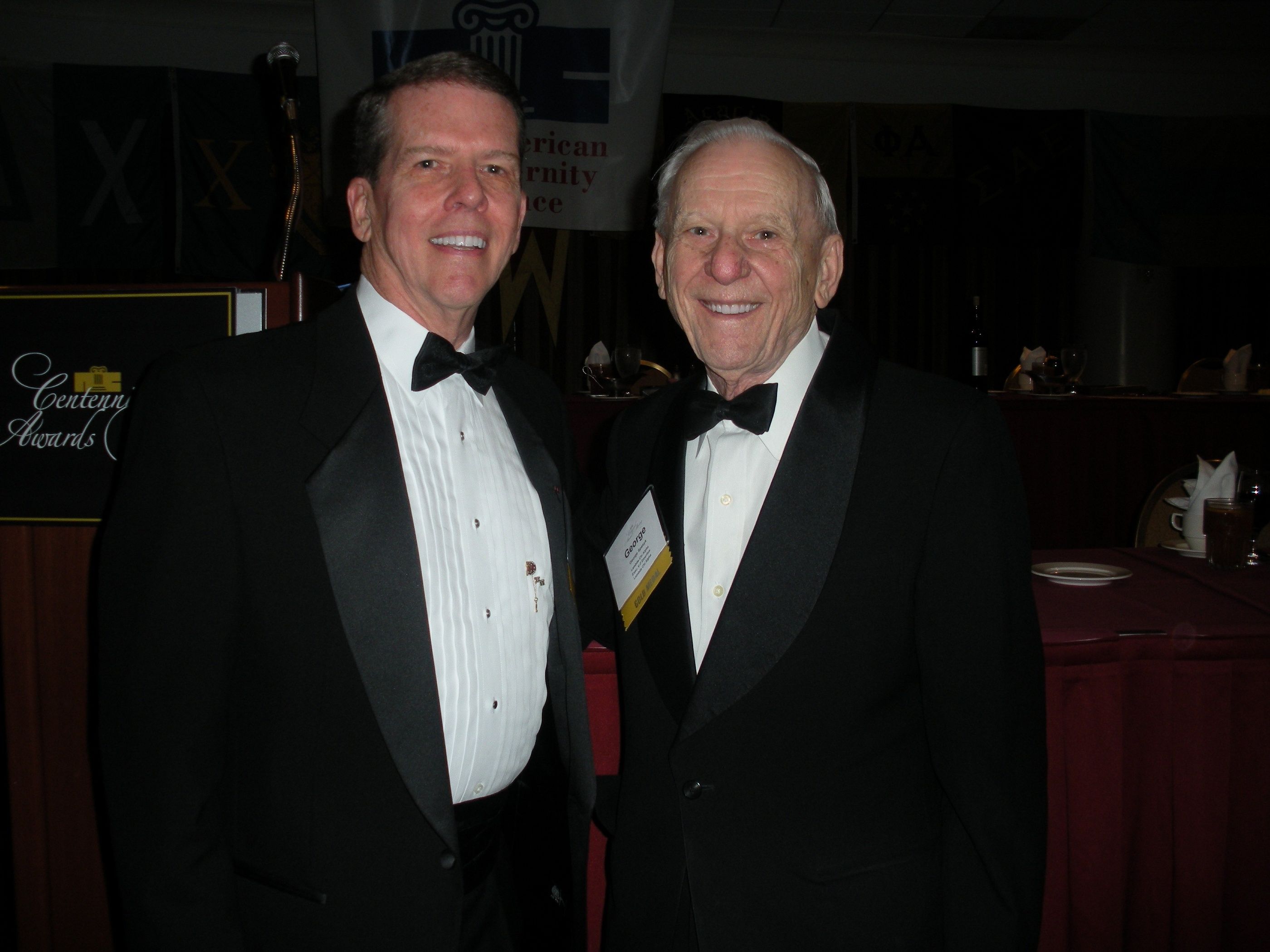
George also pointed out in his article that the rights of students were not protected by due process under this doctrine. If a student broke a rule then punishment quickly followed. No due process or fear of helicopter parents inhibited school officials. When students were caught breaking a rule they knew that punishment was quick to come their way.
At the time he wrote this article George could see a developing trend on campuses throughout the country. This trend involved more and more university officials trying to reassert their authority over student conduct. This effort on the part of university officials was sometimes subtle as in the case of “relationship statements” and other times their efforts were strong handed as with rules governing fraternity membership recruitment, housing, and even the number of members who could join a fraternity.
George also had a big problem with the unfairness and inconsistencies found in the application of rules and regulations. Fraternity members were and still are treated differently than members of other student organizations. He also noted that legal issues and the resulting liability these issues created had forced school administrators to try and combat student behavior through more rules and regulations,
This article was very typical of George’s writing: short, insightful, and timeless. Some twenty-seven years after the appearance of his last article his writings are still well worth reading.
Of course, there was much more to George Spasyk’s career and life than his ability to craft words. George came into contact with many people over the course of his career. People also saw him as a philosopher, leader, mentor, gifted speaker, friend, colleague, consensus builder, and fearless champion of his Fraternity.
George W. Spasyk Obituary
George W. Spasyk, 95, Indianapolis, died May 16, 2019. The former executive director of Lambda Chi Alpha Fraternity, George dedicated his life, unselfishly, to the development of collegiate men.
The youngest of nine children, George was born in Pittsfield, Massachusetts on July 25, 1923. After graduating from high school at the age of 16, he entered a training program at General Electric Co. that sent him to nearby Williams College for intensive study in analytical chemistry. The next six years saw him working on the Manhattan Project while also serving in the United States Navy. He enrolled in the University of Michigan in the fall of 1946 where he joined Lambda Chi Alpha. After completing his graduate degree in business administration, he joined the staff of Lambda Chi Alpha as a traveling secretary. Two years later he became service secretary, in charge of the undergraduate operations of the fraternity. He would continue in that position until 1968 when he became executive director, a position he held until his retirement in 1990.
During his 40 years of service to Lambda Chi Alpha, it grew from 137 to 223 chapters and its membership increased from 50,000 to 196,000 initiated members. In 1972, under his leadership, the fraternity’s General Assembly voted to adopt the Associate Member Program, effectively removing “pledgeship” from the fraternity.
George received scores of recognition plaques and awards from the chapters of Lambda Chi Alpha and inter/national fraternities. He was awarded Lambda Chi Alpha’s Order of Achievement in 1990 and, in his honor, the fraternity created the George W. Spasyk Order of Interfraternity Service to recognize those men and women who have contributed outstanding service in the betterment of all college fraternal organizations. In addition, he has been honored by the highest awards within the interfraternity community including the North-American Interfraternity Conference’s Gold Medal, the Fraternity Executive Association’s Distinguished Service Award, and the Association of Fraternity Advisors’ Jack Anson Award.
He is preceded in death by his parents, George and Polly Weczerkovska Spasyk, and eight siblings: William (Madeline), Steven (Dorothy), Peter (Ann), Michael (Helen), John (Jean), Nellie Caccamo (Dominick), Ann Spasyk and Mari Theilig. He is survived by a three nieces and one nephew.
Memorial contributions may be made in his honor to the George W. Spasyk Memorial Endowment Fund of the Lambda Chi Alpha Educational Foundation.
There will be a private family burial. In the coming months, the Lambda Chi Alpha International Headquarters will schedule multiple celebrations of life both in Indianapolis and at the Stead Leadership Seminars in Denver and St. Louis.
Never miss a post! Subscribe to our email mailing list by clicking here.

